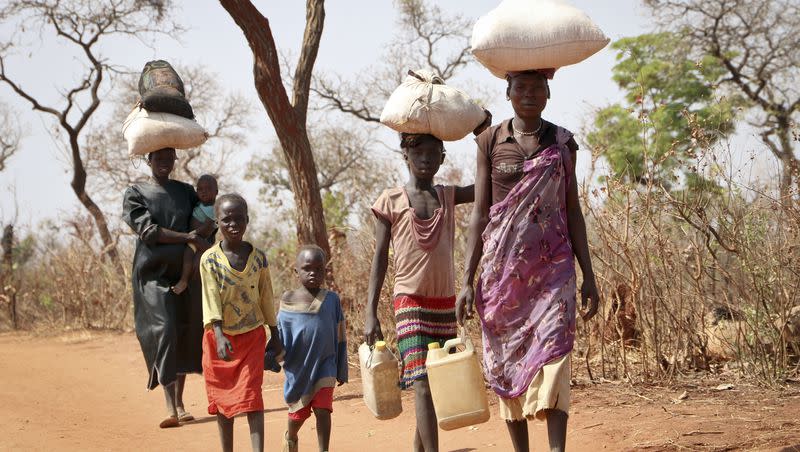Opinion: 400 people killed. Biohazardous samples seized. Has Sudan reached its worst-case scenario?

Imagine being forced to leave your home because of war, walking hundreds of miles to relative safety in a neighboring country, eking out a meager living to keep your family fed — and then war finds you again.
Talk about making a hard life harder.
That’s the situation that refugees in Sudan find themselves in as heavy fighting broke out in the middle of April. It has turned the capital, Khartoum, into a ghost town. There’s no water, no power, no health care and no food. Armed men are invading homes to “rob, rape and kill,” as reported by The Washington Post, and those who can are fleeing for their lives. According to The New York Times, regional spokeswoman for the United Nations refugee agency, Faith Kasina, said, “The humanitarian impact of this crisis is going to be almost unimaginable. The worst case scenario is unfolding right before our eyes.”
The humanitarian crisis includes not just the outbreak of violence and lack of basic necessities, but the displacement of people in an area rocked by violence, poverty and natural disasters. There has been war (some say genocide) in Ethiopia, starvation and fighting in South Sudan, flooding in Sudan and South Sudan and a coup in Chad. According to United Nations High Commissioner for Refugees data, Sudan was home to 1.14 million refugees, most of them from South Sudan, an independent country roiled by civil war since 2011. They have also hosted refugees fleeing from conflicts in Eritrea, Ethiopia and Syria. Now many of those refugees are on the move again.
Related
This month’s explosion in violence has been simmering since 2019 when Omar al-Bashir was overthrown. The former president had been indicted by the International Criminal Court for war crimes and crimes against humanity for murder, extermination, forced relocation, torture and rape. Women called “Kandakat,” named after Nubian queens, led the revolt.
There was an effort to transition to a democracy, but in 2021, Gen. Abdel Fattah Burhan, who leads the armed forces, and Gen. Mohammed Hamdan Dagalo (known as Hededti), who leads the paramilitary group called the Rapid Support Forces, led a military coup and took power.
During the time between the coup and the conflagration that began on April 15, both sides worked to fill their war chests and woo other international powers to support them, including Russia (and the Wagner group), Egypt, Libya and the United Arab Emirates. They’ve also been engaged — at least superficially — in talks about power, peace and governmental structure.
Jacqueline Burns, a former adviser to the U.S. special envoy for Sudan and South Sudan, and a senior policy analyst at the nonprofit, nonpartisan Rand Corporation think tank, wrote about the problems with what she calls “never-ending peace negotiations” in the region.
Armed groups and dictatorial regimes know that as long as they are participating in a peace process, international pressures will eventually — often quickly — ebb. If they are pressed into signing an agreement, there are typically very few effective mechanisms to hold them to it. What’s more, the time put into these peace processes — which in Sudan’s case amounted to decades — is spent by the armed groups amassing political and military power.
She says that international interveners legitimize those armed groups “as the only valid power brokers or voices that need to be heard.” Women, in spite of leading the 2019 revolt, have been left out of the peace process almost exclusively. As I’ve written previously, research by Marie O’Reilly, Andrea Ó Súilleabháin and Thania Paffenholz has already shown that when women are at the negotiating table, the peace agreement reached is 35% more likely to last at least 15 years. Desirée Nilsson’s research from 2012 found that when civil society groups, including women’s organizations, are involved in making a peace agreement, it is 64% less likely to fail than if they are not involved.
Related
Further, Burns writes, if the international community truly wants to stop the “continued cycle of violence and human suffering,” they must stop prioritizing the “armed and corrupt” over those seeking “real reform and representation.” What should be clear, writes Jeffrey Feltman, a former U.S. special envoy to the Horn of Africa and former U.N. undersecretary general for political affairs, is “that Burhan and Hemedti are not reformers — and that they will never be reformed.”
In the meantime, more than 400 people have been killed, a lab containing biohazardous samples of measles, cholera, polio and other pathogens has been seized by one of the fighting parties and the fourth cease-fire agreement in 10 days failed to hold. The ink wasn’t even dry.
Holly Richardson is the editor of Utah Policy. rfubn ol;;;;;;;t.rygy

